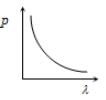4 eV is the energy of the incident photon and the work function in 2eV. What is the stopping potential ?
(1) 2V
(2) 4V
(3) 6V
(4)
(1) 2V
The magnitude of saturation photoelectric current depends upon
(1) Frequency
(2) Intensity
(3) Work function
(4) Stopping potential
A particle of mass M at rest decays into two particles of masses and , having non-zero velocities. The ratio of the de-Broglie wavelengths of the particles, is
(a) / (b) /
(c) 1.0 (d)
A photon and an electron have equal energy E, then is proportional to
(1)
(2)
(3) 1/E
(4) Does not depend upon E
A photon of Joules is absorbed by a material under special circumstances. The correct statement is:
1. Electrons of the atom of absorbed material will go the higher energy states
2. Electron and positron pair will be created
3. Only positron will be produced
4. Photoelectric effect will occur and electron will be produced
In a photoemissive cell with executing wavelength , the fastest electron has speed v. If the exciting wavelength is changed to 3/4, the speed of the fastest emitted electron will be
(a) (b)
(c) Less than (d) Greater than
The ratio of de-Broglie wavelengths of molecules of hydrogen and helium which are at temperature 27 and 127 respectively is
(1)
(2)
(3)
(4) 1
The ratio of de-Broglie wavelength of a -particle to that of a proton being subjected to the same magnetic field so that the radii of their path are equal to each other assuming the field induction vector is perpendicular to the velocity vectors of the -particle and the proton is
(1) 1
(2)
(3)
(4) 2
Which of the following figure represents the variation of particle momentum and the associated de-Broglie wavelength?
1. 
2. 
3. 
4. 
The stopping potential as a function of the frequency of the incident radiation is plotted for two different photoelectric surfaces A and B. The graphs show that work function of A is
(1) Greater than that of B
(2) Smaller than that of B
(3) Equal to that of B
(4) No inference can be drawn about their work functions from the given graphs







